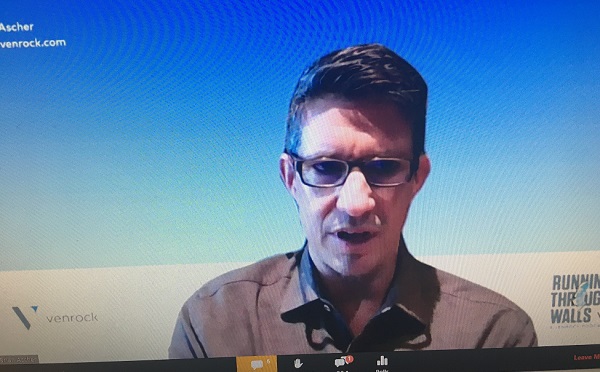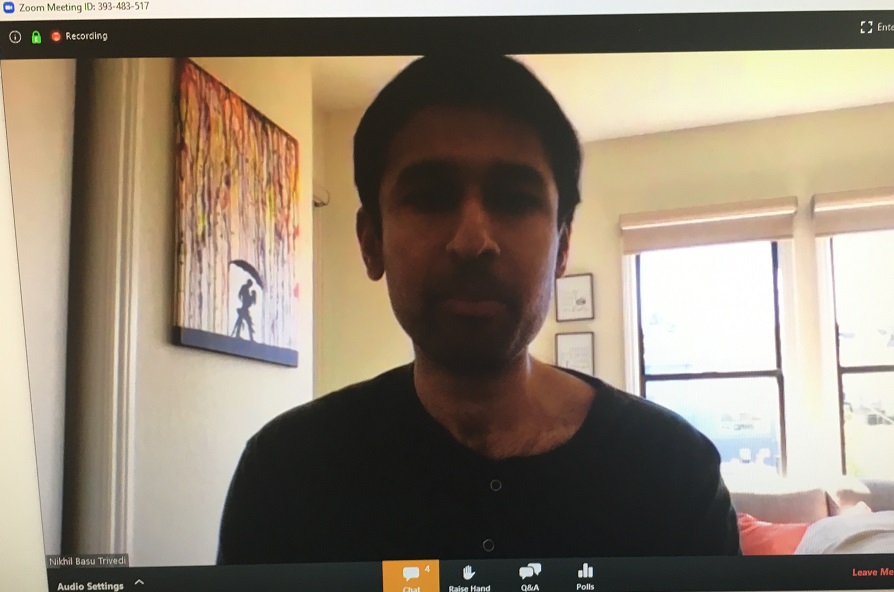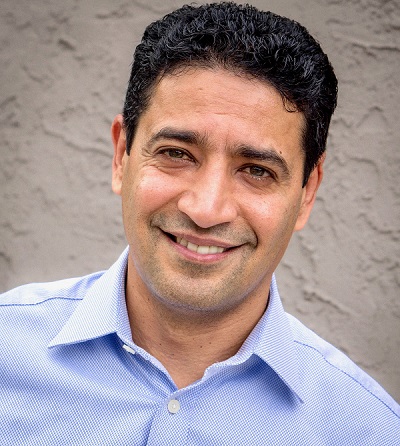Tough Times Ahead for Startups, Which May Need to Cut Staff, Rein in Marketing Spend
The best thing to do if you’re unemployed due to the economic crisis fueled by COVID-19 is to go work on your own idea, said Nikhil Basu Trivedi to an audience of founders and investors in a recent Princeton Entrepreneurship Council webinar.
That’s what he did when he was a student at Princeton during the last economic downturn. Trivedi is now a managing director at Shasta Ventures (Menlo Park, Calif.). He added that many great companies have come out of recessions.
Also participating in the webinar were Brian Ascher, a partner at Venrock (Palo Alto, Calif.), and Dror Futter, a partner at Rimon Law (Hackensack), both of them also Princeton grads. The event was moderated by Lauren Bender, Alumni Entrepreneurship Fund Manager for the council.
Cash Is King

Ascher had some very strong views on what startup entrepreneurs should be doing to keep their companies going.
“Cash is king,” he said. “The days of ‘blitz scaling’ are over for now, and it’s because the abundant equity at minimally diluted prices has essentially dried up.” He noted that a few exceptional rounds will get done, and everyone will point to them and want to believe that it means that things aren’t that bad. “But you really can’t count on yourself being an outlier.”
If you have 12 months of runway left, “then you want to do everything you can to stretch it to 18.” Also, “If you have under 12 months of cash runway, then you’re absolutely going to have to cut and get very creative and try and scrape by. And it’s just as important to remember that $1 saved now — immediately — is worth several if you must go out into really bleak financial markets to raise capital.”
Everyone has a freeze on hiring, and not filling any slots that were open before the crisis. “And folks are going to be forced to make head-count cuts, as harsh as that may seem. People are definitely tightening their marketing spend, in most cases quite significantly, and really only investing in the channels that have the strongest ROI [return on investment] for their business in this climate. And everyone is pretty much trying to work with their landlords and vendors and looking for concessions.”
“If you are making cuts, you really want to try and cut once, deeply and early, and be very clear explaining why it’s necessary for the survival of the company to make these cuts.” Brian Ascher, Venrock
Ascher noted that, during times like these, clear communication is essential. “The troops are scared, you’re scared. And, so, CEOs are hosting town halls and office hours, even over Zoom. Teams are doing daily stand-ups, etcetera.” It’s important to talk straight and honestly with the troops, and “if you are making cuts, you really want to try and cut once, deeply and early, and be very clear explaining why it’s necessary for the survival of the company to make these cuts.”
You must try to instill a sense of “psychological safety amongst the team that will be staying” with the company so that they “don’t come to work every day expecting another shoe to drop,” he said. It’s important to be hardheaded about the decision to fire, he added, but softhearted about the implementation. “And that may mean extended health insurance for the employees that were let go, as well as severance packages and help with placements into other jobs. This is where you know your venture investors can help, since they have a portfolio that may actually be looking for hires even in tough times.”
Understand Your Fiduciary Obligations
Futter emphasized that now is the time for startup founders to understand their fiduciary obligations. “So many of you are officers or directors or are investors who serve as officers. You have different stakeholders and you have different traditional obligations to each.” He added that he could do a presentation lasting several hours on just the legal topics involved; but, of course, this presentation had to be shorter.
He then noted that companies must answer to their shareholders, creditors and employees. The critical point on the organization level is that if “your company is on shaky ground, there is a pivot point in terms of your fiduciary obligations.” As you get closer to potential insolvency, your obligations, which are normally focused on maximizing shareholder value, switch to focusing on assets for creditors. That involves a change of mindset. “And you should consult with counsel if you’re getting to that point, to understand withdrawal obligations. It’s important that policies are in place and are adequately funded.”
“If you remember nothing else in this call, make sure you have money set aside for all wage payments and tax obligations. And those are not discretionary. They are mandatory.” Dror Futter, Rimon Law
In a note to those startup founders who will fail during the economic downturn, Futter said that there will be less litigation involved in folding their companies than you would think. In the long term, players understand that good startup founders will come together with them to do “good things in the future.”
Finally, he said, “If you remember nothing else in this call, make sure you have money set aside for all wage payments and tax obligations. And those are not discretionary. They are mandatory.”
Going Into Survival Mode

According to Trivedi, the priority at Shasta Ventures during this time is to think about the health and welfare of families and adjusting to the new paradigm of working from home. Secondly, the VC firm is thinking about the impact of COVID-19 on its portfolio companies and on the economy as a whole. And priority three is “communicating with our limited partners, who are the ones that give us capital to invest, and understanding how this crisis is affecting them.”
Trivedi said that he’s trying to understand everything about the portfolio companies and what their cash positions look like. Who will need to raise capital over the next 12 months? Because it’s likely that this next year will present a challenging fundraising environment for many companies.
Regarding the companies that are having a rough time, he noted that VCs are asking “who can cut costs and who can go into survival mode, so to speak, to make sure that they have enough money to get out of this crisis and get to the other side, whenever the recovery happens.”
Also, Shasta is thinking about its own reserves. “When we make investments in companies, we typically reserve capital against those investments with follow-on rounds of funding. But we don’t have infinite capital.”
“It strengthens entrepreneurs to go through a crisis like this and come out the other side. ” Nikhil Basu Trivedi, Shasta Ventures
While Trivedi might make new investments during this time, many categories will be hard to invest in right now, he said. Anything in travel is now very difficult to invest in. Anything related to restaurants and other small or medium-sized businesses that are getting very negatively impacted by COVID-19 “is a difficult message today.” In general, “given how many people are cutting back on spending or losing their jobs, and are unlikely to make many discretionary purchases,” startups will be challenged in a number of categories.
On a brighter note, Trivedi said that “it strengthens entrepreneurs to go through a crisis like this and come out the other side. There are many talented people still starting companies. It’s a harder fundraising environment. And, so, the ones that can raise money are often stronger as a result.”



